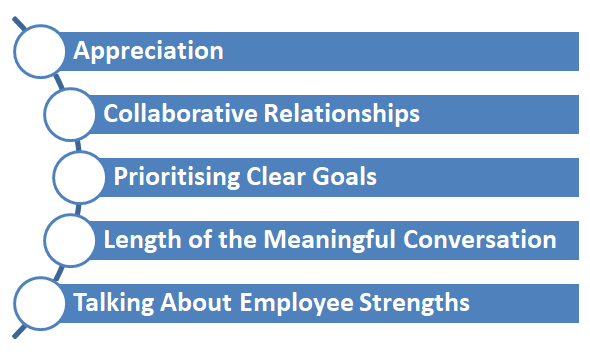

Introduction
Are you a management student? Are you looking for a job because you are not engaged at your current job? Do you feel your manager/superior is not helpful to your team? Are you a manager and you feel your team is disengaged at work? You are not alone, only 20% of the world’s working employees are engaged in their work. Why is the reason for such dwindling numbers? How can businesses and managers increase their employee’s engagement?
In this blog we will discuss 1 habit to make you a great manager. This habit can help businesses increase their productivity at no extra cost. Allow us to explain further.
Employee Engagement and Organisation

Businesses seek talent as much as they strive for growth. The human resource is the main driver of the visions, goals, and mission of these business. The entire employee hierarchy at these businesses engages people who show qualities of smartness, intelligence, imagination, creativity, loyalty, leadership, and management. Apart from hiring the best talent, organisations also develop employee engagement strategies. Employee engagement is immensely powerful and effective in retaining talent at any level of an organisation. Statistics from Gallup’s study called ‘State of the Global Workplace’ shows 85% of employees worldwide are not engaged in the workplace. And do not confuse engagement with employee happiness.
Employee engagement, according to Investopedia is “the level of enthusiasm and dedication a worker feels toward their job.” It simply quantifies an employee’s productivity to his zeal to do the job.
That being the case how does an organisation engages employees effectively?
The answer is through their managers.
Managers And Employee Engagement

Gallup (A global analytics and advice firm which helps leaders and businesses solve crucial issues) has found in a study that says 70% of a team’s engagement variable depends on its management and the manager is responsible for this engagement. A healthy and effective management conditions employees for better production.
Managers who take regular meetings and engage with their team in constructive feedback, goal discussions and other important job roles increase their team’s performance substantially. So how do managers engage teams?
With this 1 habit:
The Habit of ‘Meaningful Conversations’
It is given in the new book from Dr. Jim Harter, a Chief Scientist at Workplace for Gallup, called “Culture Shock”. The research in the book tells that meaningful conversations engage employees better. Then the question arises what is a meaningful conversation and how to do it? Gallup has rounded the 5 traits of meaningful conversations

5 Traits of a Meaningful Conversation

- Appreciation: When employees are appreciated for the work, they do they work harder. The right amount of appreciation the manager connects with his team as well as boosts productivity.
- Collaborative Relationships: Gallup found that relationships between colleagues’ impact employee retention. Managers play a major part when connecting compatible team members with each other.
- Prioritising Clear Goals: Clear vision of goals is important for employees or else their productivity is impacted. A weekly check-in from the manager is important for keeping the team on track with their goals and targets.
- Length of the Meaningful Conversation: Gallup says that a meeting time of 15-30 minutes is sufficient for a meaningful conversation, and it should happen frequently. The meeting might have to be longer if there are no regular conversations.
- Talking About Employee Strengths: Gallup says to talk employees about the strengths they have and how effectively they use them to get the job done. This way the conversation would be more meaningful to the specific individual rather than being generic or vague.
Gallup’s Meta Analysis has found that organisations with highest scores in employee engagement also showed 21% higher profit increase. Meaningful conversations between employees and managers is that “1 habit” that makes a manager a GREAT manager.
Conclusion
It is safe to say that managers when focus on appreciation, collaboration, and strength of their team the engagement skyrockets. Feedback or review on a regular basis is important for the employees. The employees under such managers want to stay in the organisation for a longer period while performing and achieving their goals.
At SIT (Stanford Institute of Technology) we offer courses in Leadership and Management that teaches you how to excel at being a leader and manager. To know more click here
